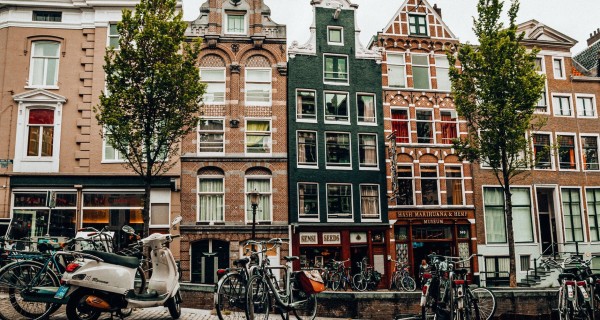Netherlands Visa for Recent US University Graduates

Are you a recent Master’s/PhD graduate from one of the Top 200 US universities? If so, you may qualify for a Netherlands Search Year visa. With the search year visa, you are allowed to work in the Netherlands without a work permit! For the purpose of obtaining this visa, you do not need to have visa sponsorship. This visa is open to both American citizens and citizens of other countries.
What is Netherlands Search Year visa?
For the purpose of attracting global talents, the Netherlands Government introduced the search year visa a few years ago. Recent Master’s/PhD graduates from Top 200 universities worldwide can apply for a search year visa. When applying for the search year visa, your Master’s/PhD degree certificate may not be older than three years. Also, when you obtained your Master’s/PhD degree, the ranking of your university, your faculty or your department must be among Top 200 worldwide. This global ranking must be confirmed by at least two of these three publishers: QS, Times or Shanghai Academic.
Visa validity and work rights
The search year visa is valid for 12 months. During the validity of the search year visa, you will gain unlimited access to the Dutch labour market. Your residence card will have the labour market remark “Arbeid vrij toegestaan. TWV niet vereist” (in English: Employment allowed. No work permit required). In other words, during the validity of the permit, you will be treated as if you are a Dutch/EU citizen, being able to work freely without a work permit in the Netherlands.
Which US universities are among Top 200?
In general, a lot of American universities have good global rankings. If you are a recent graduate of these universities, you may qualify for a search year visa:
Massachusetts Institute of Technology, Harvard University, Princeton University, Stanford University, California Institute of Technology, University of California (Berkeley), Yale University, the University of Chicago, University of Pennsylvania, Johns Hopkins University, Columbia University, University of California (LA), Cornell University, University of Michigan-Ann Arbor, Carnegie Mellon University, University of Washington, Duke University, Northwestern University, New York University, University of California (San Diego), Georgia Institute of Technology, University of Illinois at Urbana-Champaign, University of Texas at Austin, University of Wisconsin-Madison, Brown University, University of California (Davis and Santa Barbara), Washington University in St. Louis, University of North Carolina at Chapel Hill, University of Southern California, Boston University, Purdue University West Lafayette, University of Massachusetts, University of Minnesota, University of California (Irvine), Vanderbilt University, Emory University, Penn State (Main campus), Rice University, University of Maryland (College Park), Ohio State University, Michigan State University, University of Rochester, University of Florida, University of Arizona, University of Pittsburgh-Pittsburgh campus, Texas A&M University, University of Colorado Boulder, Case Western Reserve University, University of Virginia, Dartmouth College, Tufts University, Indiana University, University of California (Santa Cruz), University of Notre Dame.
(No rights may be derived from this list)
Where can I apply for the visa?
If you are a US citizen, you can come to the Netherlands on your US passport. After your arrival, you can submit your residence permit application. If you are a citizen of the USA, Canada, Australia, Japan, New Zealand or South Korea, you can also come to the Netherlands and submit your application in the Netherlands.
If you are from other countries (than the ones mentioned above), you will need to ask for a so called MVV entry clearance visa with a Dutch diplomatic mission outside the Netherlands. At the moment, there are three Dutch consulates in the United States of America (where you can submit your MVV application). They are located in New York City, Miami and San Francisco. Without this MVV entry clearance visa, you cannot obtain a residence card directly in the Netherlands.
Do I need to prove funds?
No, as you will have unlimited access to the Dutch labour market, you do not need to prove funds when applying for the search year visa.
Can I bring my family members with me to the Netherlands?
Yes, in general, you can bring your (un)married partner and your minor children with you. They will obtain a family member visa and will also have the same access to the Dutch labour market. However, please be aware that, depending on your family members’ nationalities, they may need an MVV entry clearance visa before travelling to the Netherlands. If you want to bring your dependent family members with you, you will need to show funds. Please feel free to contact Mynta Law and discuss about the issue as to how you can show funds.
My diploma was obtained in 2021 (or earlier). Can I still apply for the search year visa.
Unfortunately, the Dutch Immigration Department follows a very strict interpretation of the three year term. If your diploma is older than three years on the application date, you no longer qualify for the search year visa. Therefore, if you obtained your diploma in 2021 or earlier, you no longer qualify for the search year visa.
What other documents do I need?
Your diploma also needs to be assessed by a semi-governmental organization in the Netherlands. This diploma assessment certificate is a prerequisite for the search year visa.
What about the year after the search year?
The search year visa is only valid for 1 year and it cannot be extended. However, if you manage to find a job as a highly skilled migrant within the search year, you may qualify for a highly skilled migrant visa. As a search year visa holder, a reduced salary threshold will be applicable, when you apply for a highly skilled migrant visa. As from 1 January 2025, the reduced salary threshold is 2989 euros per month (before tax). You can find more information about the highly skilled migrant visa on this site.
Are the Dutch work visas lottery based?
No, we don’t have a system like the H1B lottery. In other words, an eligible applicant does not need to participate in any kind of lottery.
How long does it take to become a permanent resident or a citizen in the Netherlands?
Five years. For many people, this is much shorter than in the USA.
Are you interested in applying for the search year visa? Do you have more questions about the search year visa, please feel free to contact Mynta Law.

Related articles
- How Not To Transfer Your Main Residence - Everything Expats Should Know
- Payrolling Highly Skilled Migrants? Here are the pro's and con's
- New coalition agreement: key points, timeline and game plan
- Which Salary Threshold Applies to Which Highly Skilled Migrant?
- Greater opportunities under the new EU Blue Card Directive 2021/1883
- Two Types of Permanent Residence Permits in the Netherlands: This is What You Need to Know About Them
- EU long term residence permit despite residence gap
- Income requirements and permanent residence
